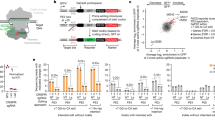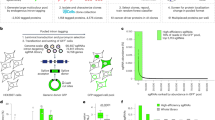Abstract
Much of the regulation of gene expression occurs at the level of protein synthesis. In addition to the canonical translation factors, a multitude of proteins and microRNAs (miRNAs) act as regulatory trans-acting factors. Mechanistic analysis of translational control benefits from functional cell-free systems that can be depleted of the responsible regulatory factors. Although antisense oligonucleotides facilitate the functional sequestration of the regulatory RNAs, immunodepletion of protein factors is technically challenging. Here we describe a simple and robust alternative protocol for the preparation of factor-depleted in vitro translation system derived from HeLa cells. The procedure relies on RNA interference–mediated knockdown of the factor of interest prior to extract preparation, and it overcomes problems with the availability and specificity of antibodies, as well as with the co‐depletion of proteins associated with the factor under study. The complete procedure can normally be conducted within 1 week and carried out in parallel for multiple (candidate) factors.
This is a preview of subscription content, access via your institution
Access options
Subscribe to this journal
Receive 12 print issues and online access
$259.00 per year
only $21.58 per issue
Buy this article
- Purchase on Springer Link
- Instant access to full article PDF
Prices may be subject to local taxes which are calculated during checkout


Similar content being viewed by others
References
Sokoloski, K.J., Wilusz, J. & Wilusz, J. The preparation and applications of cytoplasmic extract from mammalian cells for studying aspects of mRNA decay. Methods Enzymol. 448, 139–163 (2008).
Lee, K., Bindereif, A. & Green, M.R. A small-scale procedure for preparation nuclear extracts that support efficient transcription and pre-mRNA splicing. Gene Anal. Tech. 5, 22–31 (1988).
Mathonnet, G. et al. MicroRNA inhibition of translation initiation in vitro by targeting the cap-binding complex eIF4F. Science 317, 1764–1767 (2007).
Wakiyama, M., Takimoto, K., Ohara, O. & Yokoyama, S. Let-7 microRNA-mediated mRNA deadenylation and translational repression in a mammalian cell-free system. Genes Dev. 21, 1857–1862 (2007).
Pisarev, A.V. et al. The role of ABCE1 in eukaryotic post-termination ribosomal recycling. Mol. Cell. 37, 196–210 (2010).
Svitkin, Y. & Sonenberg, N. An efficient system for cap- and poly(A)-dependent translation in vitro. Methods Mol. Biol. 257, 155–170 (2004).
Bergamini, G., Preiss, T. & Hentze, M.W. Picornavirus IRESes and the poly(A) tail jointly promote cap-independent translation in a mammalian cell-free system. RNA 12, 1781–1790 (2000).
Thoma, C., Ostareck-Lederer, A. & Hentze, M.W. A poly(A) tail-responsive in vitro system for cap- or IRES-driven translation for HeLa cells. Methods Mol. Biol. 257, 171–180 (2004).
Witherell, G. In vitro translation using HeLa extract. Curr. Protoc. Cell Biol. 11.8.1–11.8.10 (2000).
Mukherjee, D., Fritz, D., Kilpatrick, W.J., Gao, M. & Wilusz, J. Analysis of RNA exonucleolytic activities in cellular extracts. Methods Mol. Biol. 257, 193–211 (2004).
McKendrick, L., Morley, S.J., Pain, V.M., Jagus, R. & Joshi, B. Phosphorylation of eukaryotic initiation factor 4E (eIF4E) at Ser 209 is not required for protein synthesis in vitro and in vivo. Eur. J. Biochem. 266, 5375–5385 (2001).
Gallie, D.R. & Browning, K.S. eIF4G functionally differs from eIFiso4G in promoting internal initiation, cap-independent translation and translation of structured mRNAs. J. Biol. Chem. 276, 36951–36960 (2001).
John, M., Geick, A., Hadwiger, P., Vornlocher, H. & Heidenreich, O. Gene silencing by RNAi in mammalian cells. Curr. Protoc. Mol. Biol. 47, 26.2.1–26.2.14 (2010).
Sakurai, K., Chomchan, P. & Rossi, J. Silencing of gene expression in cultured cells using small interfering RNAs. RNA-based methods in cell biology. Curr. Protoc. Cell Biol. 47, 27.1.1–27.1.28 (2010).
Thoma, C., Bergamini, G., Galy, B., Hundsdoerfer, P. & Hentze, M.W. Enhancement of IRES-mediated translation of the c-myc and BIP mRNAs by the poly(A) tail is independent of intact eIF4G and PABP. Mol. Cell 15, 925–935 (2004).
Hundsdoerfer, P., Thoma, C. & Hentze, M.W. Eukaryotic translation initiation factor 4GI and p97 promote cellular internal ribosome entry sequence-driven translation. PNAS 38, 13421–13426 (2005).
Acknowledgements
This work was supported by a grant from the Deutsche Forschungsgemeinschaft to M.W.H. A.M.R. was funded by a postdoctoral European Molecular Biology Organization (EMBO) long-term fellowship and an International Incoming Marie Curie Fellowship (European framework 7th). We thank Y.V. Svitkin and N. Sonenberg (McGill University) for recombinant eIF4E plasmid.
Author information
Authors and Affiliations
Contributions
A.M.R. and M.W.H. designed the experiments, analyzed the data and wrote the manuscript. A.M.R. performed the experiments.
Corresponding author
Ethics declarations
Competing interests
The authors declare no competing financial interests.
Rights and permissions
About this article
Cite this article
Rakotondrafara, A., Hentze, M. An efficient factor-depleted mammalian in vitro translation system. Nat Protoc 6, 563–571 (2011). https://doi.org/10.1038/nprot.2011.314
Published:
Issue Date:
DOI: https://doi.org/10.1038/nprot.2011.314
This article is cited by
-
Nitric oxide-induced ribosome collision activates ribosomal surveillance mechanisms
Cell Death & Disease (2023)
-
Human NMD ensues independently of stable ribosome stalling
Nature Communications (2020)
-
RAN translation at C9orf72-associated repeat expansions is selectively enhanced by the integrated stress response
Nature Communications (2017)
-
The RNA-binding protein vigilin regulates VLDL secretion through modulation of Apob mRNA translation
Nature Communications (2016)
-
eIF3 targets cell-proliferation messenger RNAs for translational activation or repression
Nature (2015)
Comments
By submitting a comment you agree to abide by our Terms and Community Guidelines. If you find something abusive or that does not comply with our terms or guidelines please flag it as inappropriate.



